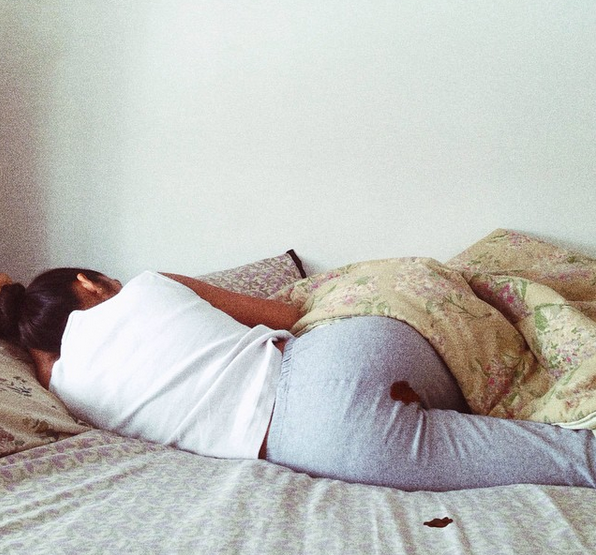
Vv Magazine’s Sarah Botelho investigates the banning of certain hashtags on Instagram—and how they’re sending a message of censorship to women in particular.
Since 2010, the social media platform Instagram has accumulated over 300 million users. That’s a whole lot of Valencia’d photos of people’s everyday lives. In today’s world, if you want to express yourself or debut a new aspect of your life, you don’t just tell people about it – you post it on social media. If you eat a healthy meal: Instagram. You got engaged? There’s definitely an adorable Instagram with your partner tagged in it. Got a new haircut? You’re raking in the likes on Instagram.
This heavy integration of social networking into our lives has created a system in which technology becomes a tool to express yourself, and even forms your sense of self-identity. So what happens when the aspects of your life that make up the very essence of who you are get slammed down with the notification: “We’ve removed your post because it does not follow our community guidelines” or in other words: “you can express yourself on Instagram, just not like that because it’s making us uncomfortable.”
ADVERTISEMENT |
This summer, Instagram issued a ban on a variety of search words that had the Internet population up in arms. And rightfully so, because they all seem to have one thing in common: women’s bodies.
Originally, these illegal search words included the hashtags #curvy, #goddess, and #bitches. Spokespersons from Instagram argued that these words were banned because they were most commonly used in photos containing nudity, which violates Instagram’s terms of service. After looking through Instagram’s legal parameters, we were left pretty confused so here it is in layman’s terms, courtesy of Gizmodo.
Basically, yes, Instagram does prohibit photos that show violence, nudity, or illegal activity, but it’s not always as simple as that. The outlawed hashtags were, in some instances, linked to images that definitely weren’t safe to look at during your work day at the office, but oftentimes they were just of regular women doing their thing. These images of plus sized women promoting body positivity (usually fully-clothed, by the way) were regulated because users on Instagram have the ability to flag photos they don’t like as inappropriate. After that, the photo goes through a screening process and if someone on the Instagram team agrees, the photo is taken down.
Instagram ultimately had the final say in removing said photos, but fellow users flagged them. Keep in mind that hashtags like #anorexic and #fat-f*ck were never in danger of being removed from the Insta-sphere. And it’s not just hashtags that are taking the heat today – Instagram has since removed or censored images of women breast-feeding, showing their *gasp* untrimmed body hair, menstrual blood, and women’s nipples. The message has been received loud and clear, Instagram: women’s bodies are inappropriate.
ADVERTISEMENT |

In response to this censorship, many women have offered up their criticisms of Instagram’s “terms of service” (and overall censorship online). Artist Katya Grokhovsky said it best: “[They want us to] cover it up, erase it, shut up, be pretty and clean, don’t show us you are a human woman. In fact, we prefer you were a hairless, ageless, oh-so-cool-sexy, tiny, easily-manipulated, shiny machine-object, not a visceral, bleeding, odor-and-noise-and-fluids-producing, food-needing, bathroom-going, valuable, capable, ambitious, smart, emotion-and pain-feeling, gloriously human being.”
This omission of women’s everyday lives is so detrimental to us as a society because it reinforces the discourse that only certain types of women who live certain kinds of lives should be able to showcase their photos online. By deleting photos of menstruation or limiting what kinds of bodies can be shown, they’re suggesting that a) those kinds of things and people don’t exist in the real world or b) those kinds of things and people shouldn’t exist in the real world – the latter of the two being the deeper message.
The fact is human beings come in all shapes and sizes. Women have breasts. They have body hair. And some of the time, they have a period. If you’re over the age of 11, you probably know all of this. So why are we so freaking scared to just come out and say it? Because as much as we’d like to deny it, a good number of women are still scared to pull out a tampon in front of a group of guys or wear shorts on a day when they haven’t shaved their legs. And if our fellow Instagram users are going to report us for showing ourselves in all of our hairy, curvy glory, we’re not going to be too inclined to show ourselves that way again.
But, fret not, dear Instagramers. Justice has (somewhat) been served.
After weeks on end of women fighting the ban on the hashtag #curvy, Instagram finally came to its senses and reintroduced it to the search word world. Additionally, the ban on #goddess has also been lifted, but #bitches is still on the inappropriate side. Girls posing with unshaved body hair are still receiving generous amounts of hate and getting their photos reported, and the same goes for those trying to demystify society’s fear of periods.
ADVERTISEMENT |
So keep fighting the good fight, ladies. And if you’re one of those pesky users reporting this stuff as “offensive,” “gross” or “disturbing,” check yourself before you wreck yourself, and sit down and dissect your reaction to these things. WHY do you feel this way, WHY is it so damn shocking, and WHY do you have no tolerance for it?
Hopefully you understand that it might not even be you thinking these things so much as it is society telling you how to think.
Related Link: Merman hair, Instagram’s gift to whimsical bros
ADVERTISEMENT |
What do you think of these words being banned from Instagram? Let Vv Magazine know in the comments below, or tweet us @ViewtheVibe.






